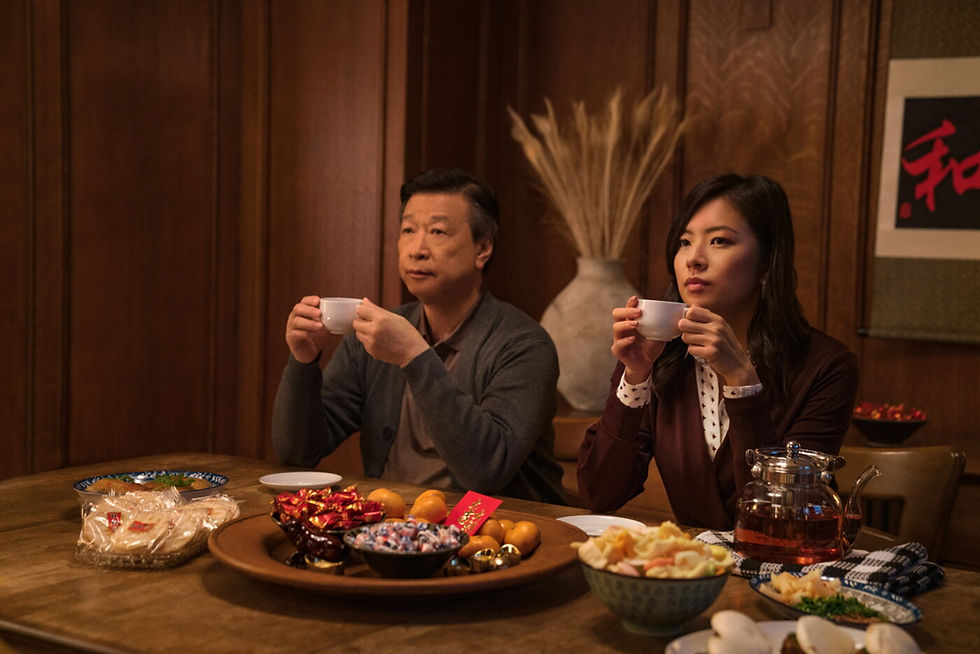Tigertail
- patrickkok
- May 16, 2020
- 3 min read
Released 2020. Director: Alan Yang

MIGRANT STORIES ON SCREEN ARE OFTEN SEEN THROUGH A MISTY LENS. Dramas about someone leaving his or her homeland for a destination of perceived greater opportunity (invariably the US of A) tend to pivot towards the heartrending almost by default. Some are more sombre than others, like Tigertail, written and directed by Alan Yang, co-creator of Emmy-winning TV series Master of None.
Structurally, Tigertail is composed of a juxtaposition of flashbacks and the present. The past is recalled in a deeper palette of rich hues whilst the present day in comparison is often desaturated, almost as if life is already draining away slowly.
Our guide down this memory lane is Grover, or Pin Jui to those who knew him in his younger days. Grover is divorced and lives alone. He’s on the far side of middle age and has a strained relationship with his daughter Angela. The man doesn’t talk much, a typical distant father who finds himself awash with memories of his earlier decisions and perhaps a few regrets unaddressed.
Many years ago back in Taiwan, Pin Jui and his widowed mother worked in a factory with scant regard for safety and welfare. Facing limited prospects, Pin Jui agreed to marry his boss’ daughter Zhenzhen so they get daddy's money to head for America. He’s a good son who wanted to be successful and bring his mother over to escape a life of labour. In doing so Pin Jui not only turned his back on a budding romance with his childhood sweetheart and first love Yuan, but he’s also left a piece of his heart and soul behind.
The flips between past and present gradually patch the story together. The transitions unfortunately expose Alan Yang’s shortcoming as a first-time feature director. They are affected and awkward stylistically. Whilst the individual scenes are shot well, we always snap back to the present looking at the pensive face of Grover or Angela, stopped in their tracks reminiscing, whether it’s in the midst of drinking coffee or washing dishes. They literally stop, and appear very unnatural and contrived. Are there people who do this in real life every time they think of the past? Some imagination would have smoothed over the transitions to achieve a more creative cinematic seque.
The rough edges are made more jarring with music that’s overbearing and repetitive, weighing down the scenes with more sorrow than needed.
The present-day Grover is living his life questioning the sacrifices he made all those years ago. Life was tough for the new couple, living in semi-squalor. There was never any genuine affection between Pin Jui and Zhenzhen, who felt displaced and unloved. The couple remained married for the sake of raising a child until the day they called it quits with some angry words exchanged. Pin Jui’s mother never left Taiwan and died at home. The pursuit of an American dream has led to a rift in the next generation.
When father and daughter find themseves together, they often share stilted scenes. It’s hard to pin down what’s wrong except to say the two actors are saying lines and making expressions as they’re instructed without nuance. Tzi Ma looks sad and Christine Ko emotes but they never engage my emotions on any level.
Pin Jui never made peace with his decision to migrate and this has a lasting impact on the relationship with his daughter. A big chunk of life is missing in the story as we see very little of the years after Angela was born. Perhaps if we’ve seen the distant relationship as the child was growing up we might be able to empathize with their current situation. Angela’s character is vital in Grover coming to terms with his past but her part is curiously under-developed with a distinct lack of clarity.
The acting is all-round better in the flashbacks, with Lee Hong-Chi playing Pin Jui, full of verve and passion until the spirit of adventure is squeezed dry by his new life. Yang Kuei-Mei, in the role of the mother, is a veteran who understands how to draw out the humanity in a simple character.
Alan Yang reportedly based Tigertail on elements from his father’s history. There’s no denying there’s plenty of story to be told here, and plenty more left out unexplored. This is a rich tapestry of inter-generational family drama with many possibilities. Yang has chosen certain aspects for his feature-movie debut, focusing on a stoic and lonely man turning the pages of his life, quietly mourning lost time and lost love. There is something precious and beautiful in all this and I wish I liked the movie more, if only I could feel the poignancy. Despite which, there’s enough emotional truth in Tigertail to make me look forward to Yang’s next movie.
Click image above to view trailer. New window will open.




Thanks for review. Got it on my list on Netflix. Will check it out.